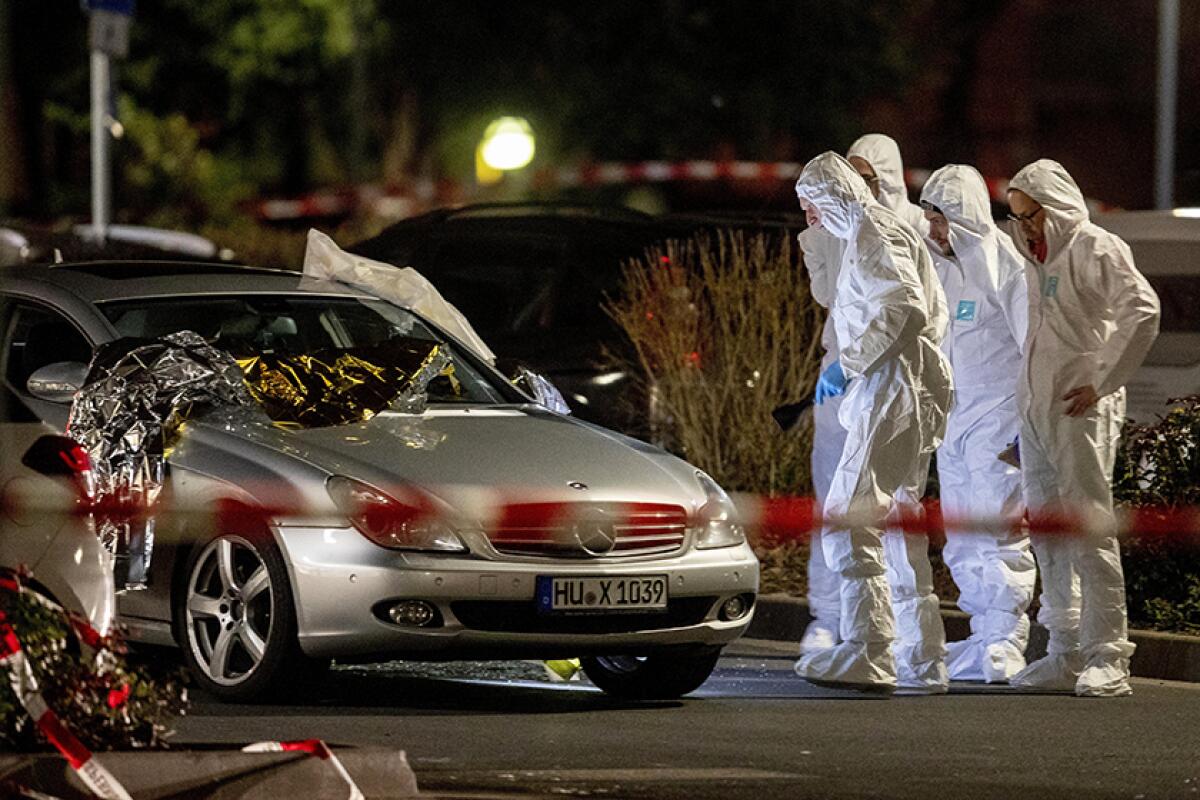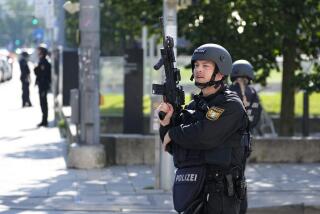Racially motivated terror attack that kills nine leaves Germany deeply unsettled

BERLIN — The latest German right-wing racially motivated attack, in which nine people of foreign descent were slain by a gunman storming three hookah bars, has deeply unsettled a nation with tight gun-control laws which has long struggled to come to terms with its Nazi past.
Chancellor Angela Merkel strongly condemned on Thursday the terror attack by a 43-year-old man who left behind a video message and manifesto strewn with racial diatribes after firing on strangers in the western city of Hanau on Wednesday.
“Racism is a poison, hate is a poison,” Merkel said in Berlin, linking the assailant to the perpetrators of a string of other far-right attacks in the past year. “This poison exists in our society and it’s to blame for far too many acts of crime. We will stand up with all our power and determination against anyone trying to divide Germany.”
The body of the gunman, identified in German media reports as Tobias Rathjen, was found early Thursday morning in his apartment along with the body of his 72-year-old mother, who was also shot dead.
The Turkish Embassy in Berlin said five of the murdered were Turkish citizens — members of a Turkish community of about 3 million living in Germany.
Federal prosecutor Peter Frank, whose office took control of the case it labeled a terrorist act, said that all of the victims were of foreign descent, and they included a pregnant 35-year-old mother of two and several Kurds, according to media reports.
Frank said police discovered a 24-page letter in the assailant’s apartment that, according to a report by Bild newspaper was filled with diatribes railing against foreigners and U.S. intelligence agencies while calling for countries like Turkey, India and Israel to be annihilated.
“There were signs of deeply racist sentiment found” on the video message and manifesto, Frank told reporters.
It was the third deadly act of far-right violence in Germany in the last nine months.
In June a local political leader in Merkel’s conservative party, Walter Luebcke, was shot in the head by a right-wing extremist after he had repeatedly expressed his support for her decision in 2015 to allow in more than a million refugees from war-torn Syria and elsewhere. In October, a shooting attack on a synagogue in the city of Halle in left two dead.
Merkel’s controversial move to allow the refugees in has caused tensions across the country and created deep rifts in her conservative party, indirectly contributing to a rise in support for a small far-right, anti-foreigner splinter party, the Alternative for Germany, that some have blamed for fomenting public anger toward immigrants.
Foreign Minister Heiko Maas also expressed his alarm about the “horrific act” in Hanau that stunned many in Germany, a country that places strict limits on those who are allowed to own guns and gives police sweeping powers to confiscate weapons. The assailant had a gun license and was a member of a sports gun club, according to German media reports.
“Right-wing terrorism has once again become a threat to our country,” Maas said. “Democracy needs to take a stand against the enemies of freedom.”
The Hesse state interior minister, Peter Beuth, told reporters that there was “definitely a racist motive” behind the shootings.
Hanau is a working class city of 100,000 with a high percentage of foreign residents, located 10 miles east of Frankfurt, the country’s financial capital.
The first shots were fired at about 10 p.m. inside the Midnight hookah bar, and two men, including the bar’s manager, were shot at close range, police said. Moments later, two people were shot at the nearby Café-Bar La Votre, they said. The assailant then drove about a mile to the Arena café-bar and shot to death another five people at about 10:30 p.m., according to authorities.
Special police commandos stormed the apartment at 3 a.m., where they found the two dead bodies.
The grisly murders revived memories of a five-year killing rampage between 2000 and 2007 of nine foreigners — eight Turks and a Greek — along with a German police officer by a far-right terror cell known as the National Socialist Underground (NSU). German authorities failed to detect the far-right extremist killers until two leaders of the NSU shot themselves in 2011 when police stumbled upon the ring by chance.
“Germany has been downplaying the danger from the far right for decades,” Oezcan Mutlu, a leader in the Greens party in Berlin who was moved to Germany from Turkey as a child, said in an interview. “For too long, people with far-right sentiment from parties like the AfD have been able to spread their incendiary ideas and portrayed Muslims as enemies. It’s time to wake up to the far-right threat.”
Hajo Funke, an author of several books on the far-right in Germany and political scientist at the Free University of Berlin, said that the rise of the AfD, which has won more than 20% of the vote in some eastern states, and the increasingly shrill anti-foreign language from some party leaders had likely played a role in the string of violence in the last nine months.
“There’s clearly a connection between the rhetoric and sentiment in Germany and the violence we’ve seen,” Funke said. “The language has gone so far at times that assailants like this feel encouraged to act.”










